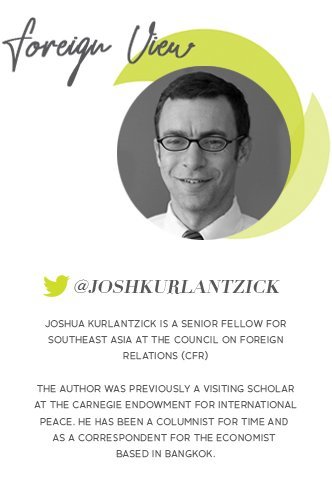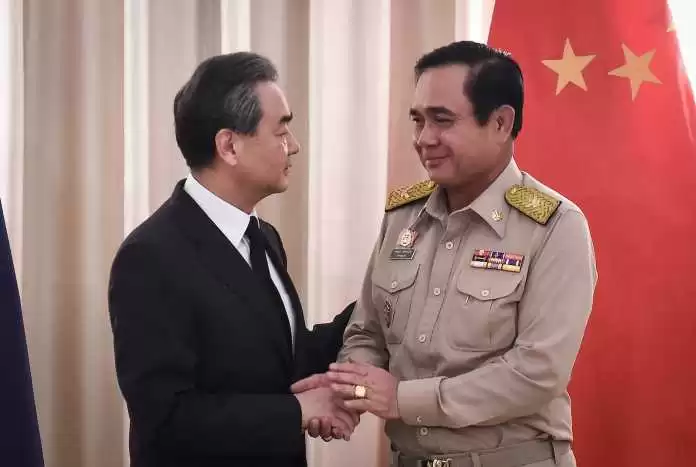 In a country ruled for much of the 2010s by a repressive military junta, and where information about powerful actors can be dangerous to dig up, Khao Sod has built a reputation as one of the most respected news outlets in Thailand. Although Khao Sod is a mass market daily with a broad readership, it is known for aggressive reporting. It has hired reporters like Pravit Rojanaphruk, one of the most fearless writers in the country. Pravit resigned in 2015 from his former employer, The Nation newspaper, after being detained by the Thai army for an “attitude adjustment session” for the “offense” of writing critically about the junta. (He also claimed in a tweet that he had been essentially fired by The Nation, and that management had asked him to resign to spare The Nation from more military pressure.)
In a country ruled for much of the 2010s by a repressive military junta, and where information about powerful actors can be dangerous to dig up, Khao Sod has built a reputation as one of the most respected news outlets in Thailand. Although Khao Sod is a mass market daily with a broad readership, it is known for aggressive reporting. It has hired reporters like Pravit Rojanaphruk, one of the most fearless writers in the country. Pravit resigned in 2015 from his former employer, The Nation newspaper, after being detained by the Thai army for an “attitude adjustment session” for the “offense” of writing critically about the junta. (He also claimed in a tweet that he had been essentially fired by The Nation, and that management had asked him to resign to spare The Nation from more military pressure.)
Khao Sod still hired him. Khao Sod is part of the bigger Matichon Group, also known for its quality, independent journalism. Matichon’s weekly magazine, heavy on politics, is as much a must-read for Thai politicians and other Bangkok political influencers as Politico’s top stories are in Washington. Khao Sod also produces an English language website that publishes tough investigative reporting, even on sensitive topics like the military and the monarchy.
Yet this reputation for quality, independent journalism did not stop Khao Sod and Matichon Group from partnering with state media from a country with one of the most repressive media environments in the world. In 2019, as Foreign Policy has reported, Khao Sod and Matichon announced a partnership with Xinhua, and Khao Sod began running Xinhua articles. Among the first Xinhua pieces Khao Sod ran, Foreign Policy noted, were articles on the Hong Kong protests that portrayed the protestors as tools of Western agitators and an article saying that China’s Xinjiang province as a place where “equality, solidarity and harmony among ethnic groups and religions have prevailed, and people are enjoying peace and stability.”
After the respected Khao Sod and Matichon Group inked a content sharing deal with Xinhua, other Thai news outlets followed suit. By November 2019, as Khao Sod itself reported, outlets including Thai state broadcaster NBT, the publication Manager Online, a mass market outlet with a smaller following than Khao Sod, and Voice Online, the website of one the most progressive, toughest television stations in Thailand, had signed deals with Xinhua. (Voice TV has proven so critical of the Thai military that the armed forces had repeatedly banned Voice TV from the airwaves for brief periods of time.) In total, by the end of the year twelve Thai language outlets had signed content sharing deals with Xinhua.
Meanwhile, The Nation had its own content sharing deal with Chinese state media. The Nation participates in the Asia News Network, a media colloquium in which more than twenty news outlets, from across the region, reprint stories from each other. Most, though not all, of the Asia News Network members are not owned or controlled by governments, and are not in any way state media. And yet all of these media outlets, many of which are prestigious organizations, share content with China Daily, a member of the Asia News Network. They regularly pick up content from China Daily, even though China Daily is a state media outlet with none of the editorial independence enjoyed by most of the other Asia News Network outlets.
Some Thai outlets touted the deals with Xinhua, although Khao Sod and Matichon executives seemed more reluctant to publicize these agreements. “Thai media [will] receive news directly from a Chinese news agency, instead of a second hand information from Western media only,” Chaiwat Wanichwattana, a journalist who has worked at the business outlet Than Sethakit and heads the Thai-Chinese Journalists Association, said proudly at a discussion timed to some of the signings. “This kind of cooperation is most welcome.”
The Thai media executives who attended the discussion with Chaiwat seemed happy about how Chinese state media stories performed on their sites, too, according to a report in Khao Sod. Some executives reportedly said that, since they started picking up Xinhua copy, Thai readers had displayed a growing interest in stories about China’s domestic affairs. Bhuvadej Chirabandhu, from the Thai site Sanook, another of the media outlets that had started picking up Xinhua copy, said that 1.4 million of Sanook’s readers had read Xinhua content posted on its site, according to a Khao Sod report. Given how many Thai news outlets are signing up for Xinhua partnerships, the Chinese government surely is happy as well.
This article was originally published by the Council on Foreign Relations and can be accessed at cfr.org



